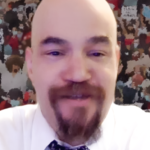“It takes deep faith and a lot of hard work to keep a democracy vibrant.”
– Rev. Wm. G. Sinkford, Former UUA President
“In our religious lives, the democratic process requires trust in the development of each individual conscience—a belief that such development is possible for each of us, as well as a commitment to cultivate our own conscience.”
– Rev. Parisa Parsa, The Seven Principles in Word and Worship
“This is no time for a casual faith. As Unitarian Universalists, we are first and foremost religious communities that practice love as our foundation.”
– Rev. Susan Frederick-Gray, UUA President

What is most tragic in the Senate’s failure to clear the way for the Freedom to Vote: John R. Lewis Act is what’s going on at the state level. In 2021, nineteen states passed more than 34 laws undermining the freedom to vote. These anti-voter laws narrow eligibility by purging voters from the rolls and enacting strict voter ID requirements. They restrict access by limiting early voting options and reducing the number of polling places in predominantly Black, Brown, and Native communities. They increase the prospects of election sabotage by allowing trusted election officials to be replaced with partisan actors, therefore, increasing the chance that every vote won’t be respected or consequently counted properly.
The cost of this Senate inaction and dereliction of duty represents a real and present danger for our individual liberty to partake in our own political destiny. For example, last year, Texas moved quickly to enact new anti-voter laws, placing its legislature at the center of the controversy. So much so, that state lawmakers came to Washington D.C. to explain what was happening to their federal counterparts. A year later, residents are experiencing the results. Up to half of the vote-by-mail applications are being rejected in some counties because of the new restrictions.
To learn more about the Texas experience, its implications for all of us, join UUSJ on February 17th when we host the “State Of Our U.S. Democracy: A UU View From The Texas Legislature,” with Texas State Representative Donna Howard, D-48 (Austin).
Last month, the Senate blocked a procedural change that would have required only a simple majority to pass much-needed voting rights legislation. After the vote, I said “52 senators came down on the wrong side of history in blocking a simple vote on our right to cast ballots in free and fair elections. Too many senators chose to defer to procedural rules instead of joining the majority of Americans who want the transformative and urgently needed Freedom to Vote: John R. Lewis Act (FTV:JLA).”
This dereliction of duty at the federal level places much more pressure on voters at the state level. Especially through the foundational systems and infrastructure of voting. The 2022 midterms now take on even greater importance, representing a steeper hill to climb for justice issues. We must all become values voters and issue voters – deeply committed to democracy as a litmus test of candidates – regardless of party. We can only address the other social justice issues that matter if we get this right. This is about confronting systemic injustice and how our collective liberation informs our ability to bend the moral arc of the universe towards justice.
Our Unitarian Universalist faith calls us to side with love, our Principles demand that we act and that the advocacy continues despite the setbacks. Therefore, we must again step into the breach to defend our democracy. We must show solidarity for those voters being shunted and sidelined in the political process.
None of us know how the story of voting rights, the freedom to vote, or fair elections will unfold in the next nine months or nine years. We do know, however, that we must continue to advocate, agitate and mobilize for a healthy and inclusive democracy. Our faith demands that much. For UUs, it’s “Voting Rights Or Bust: Collective Liberation is a Must!”
In prophetic terms, we must do the “hard work to keep a democracy vibrant.” We must “trust in the development of each individual conscience.” We must remember “this is no time for a casual faith.”

